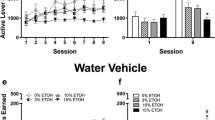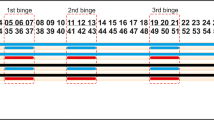Abstract
The development of tolerance to the motor impairment effect of ethanol was examined in separate groups of rats receiving and not receiving intoxicated practice. Tolerance to the motor impairment effect of ethanol developed whether or not rats received intoxicated practice during chronic ethanol treatment. Depending on the treatment dosage and test dose, intoxicated practice might enhance the level of tolerance attained. Tolerance to other effects of ethanol (hypothermia and narcosis) developed as a function of the treatment dosage. Intoxicated practice on the moving belt did not modify the development of tolerance to these effects of ethanol. Tolerance to the motor impairment effect of ethanol, however, was retained much longer in the intoxicated practice group following the termination of ethanol treatment.
Similar content being viewed by others
References
Alkana RL, Finn DA, Malcolm RD (1983) The importance of experience in the development of tolerance to ethanol hypothermia. Life Sci 32:2685–2692
Baker TB, Tiffany ST (1985) Morphine tolerance as habituation. Psychol Rev 92:78–108
Chen CS (1968) A study of the alcohol tolerance effect and an introduction of a new behavioral technique. Psychopharmacologia 12:433–440
Chen CS (1979) Acquisition of behavioral tolerance to ethanol as a function of reinforced practice in rats. Psychopharmacology 63:285–288
Gibbins RJ, Kalant H, LeBlanc AE (1968) A technique for accurate measurement of alcohol intoxication in small animals. J Pharmacol Exp Ther 159:236–242
Holloway FA, Bird DC, Holloway JA, Michaelis RC (1988) Behavioral factors in development of tolerance to ethanol's effects. Pharmacol Biochem Behav 29:105–113
Jorgensen HA, Hole K (1984) Learned tolerance to ethanol in the spinal cord. Pharmacol Biochem Behav 20:789–792
Jorgensen HA, Berge O-G, Hole K (1985) Learned tolerance to ethanol in a spinal reflex separated from supraspinal control. Pharmacol Biochem Behav 22:293–295
Jorgensen HA, Fasmer OB, Hole K (1986) Learned and pharmacologically-induced tolerance to ethanol and cross-tolerance to morphine and clonidine. Pharmacol Biochem Behav 24: 1083–1088
Kalant H, Le AD (1984) Effects of ethanol on thermoregulation. Pharmacol Ther 23:313–364
Kalant H, LeBlanc AE, Gibbins RJ (1971) Tolerance to, and dependence on, some non-opiate psychotropic drugs. Pharmacol Rev 23:135–191
Le AD, Kalant H, Khanna JM (1986a) Influence of ambient temperature on the development and maintenance of tolerance to ethanol-induced hypothermia. Pharmacol Biochem Behav 25:667–672
Le AD, El-Ghundi M, Khanna JM, Kalant H (1986b) Learning as a factor in the development of tolerance (T) to ethanol (E) and cross-tolerance (XT) to pentobarbital (PB) with respect to their motor impairment effects. Alcohol Alcohol 21:A43
Le AD, Kalant H, Khanna JM (1987a) Effects of treatment dose and intoxicated practice on the development of tolerance to ethanol-induced motor impairment. Alcohol Alcohol [Suppl 1] 435–440
Le AD, Khanna JM, Kalant H (1987b) Role of Pavlovian conditioning in the development of tolerance and cross-tolerance to the hypothermic effect of ethanol and hydralazine. Psychopharmacology 92:210–214
LeBlanc AE (1968) Microdetermination of alcohol in blood by gas liquid chromatography. Can J Physiol Pharmacol 46:665–667
LeBlanc AE, Gibbins RJ, Kalant H (1973) Behavioral augmentation of tolerance to ethanol in the rat. Psychopharmacologia 30:117–122
LeBlanc AE, Gibbins RJ, Kalant H (1975) Generalization of behaviorally augmented tolerance to ethanol, and its relation to physical dependence. Psychopharmacologia 44:241–246
Mansfield JG, Benedict RS, Woods SC (1983) Response specificity of behaviorally augmented tolerance to ethanol supports a learning interpretation. Psychopharmacology 79:94–98
Pinel JPJ, Colborne B, Sigalet JP, Renfrey G (1983) Learned tolerance to the anticonvulsant effect of alcohol in rats. Pharmacol Biochem Behav [Suppl 1] 18:507–510
Pinel JPJ, Mana MJ, Renfrey G (1985) Contingent tolerance to the anticonvulsant effects of alcohol. Alcohol 2:495–499
Siegel S (1983) Classical conditioning, drug tolerance, and drug dependence. In: Smart RJ, Glaser FB, Israel Y, Kalant H, Popham RE, Schmidt W (eds) Research advances in alcohol and drug problems, vol 7. Plenum Press, New York, pp 207–246
Tabakoff B, Melchior CL, Hoffman PL (1982) Commentary on ethanol tolerance. Alcohol Clin Exp Res 6:252–259
Tiffany St, McCal KJ, Maude-Griffin PM (1987) The contribution of classical conditioning to tolerance to the antinociceptive effects of ethanol. Psychopharmacology 92:524–528
Wenger JR, Berlin V, Woods SC (1980) Learned tolerance to the behaviorally disruptive effects of ethanol. Behav Neural Biol 28:418–430
Wenger JR, Tiffany TM, Bombardier C, Nicholls K, Woods SC (1981) Ethanol tolerance in rat is learned. Science 213:575–577
Author information
Authors and Affiliations
Rights and permissions
About this article
Cite this article
Le, A.D., Kalant, H. & Khanna, J.M. Roles of intoxicated practice in the development of ethanol tolerance. Psychopharmacology 99, 366–370 (1989). https://doi.org/10.1007/BF00445559
Received:
Accepted:
Issue Date:
DOI: https://doi.org/10.1007/BF00445559




